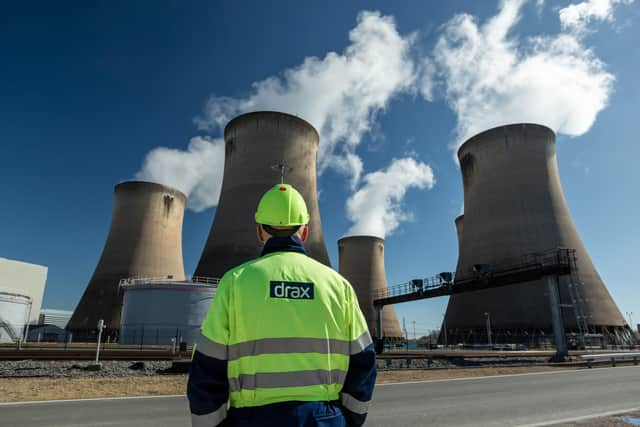Industry calls for urgent approval of carbon capture projects for biomass
Yesterday seven energy trade bodies wrote to Graham Stuart, the energy minister, which welcomed the Government’s new strategy for the energy source, but warned that the next few months will require giving the green light to a range of projects in order to reach Net Zero targets.
The technology, called BECCS, works by removing carbon dioxide emissions that come from burning natural fuels which include wood pellets, such as those used by North Yorkshire’s Drax power station.
Advertisement
Hide AdAdvertisement
Hide Ad“This proven technology removes carbon dioxide from the atmosphere, directly addressing the cause of our hotter climate,” the group said.


“The Government must act now to make it possible to deliver BECCS at all scales, or we will be left without a crucial tool for tackling climate change.
“To solve climate change, we need every tool in the toolbox, and biomass is among the most versatile of them all.”
The remaining summer and autumn months of 2023 will prove to be vital for the funding of carbon capture projects for BECCS, with several companies awaiting the go-ahead from ministers.
Advertisement
Hide AdAdvertisement
Hide AdEarlier this week, the i newspaper reported that Drax’s flagship BECCS project has been delayed by at least three years in a blow to the Government’s Net Zero strategy.
This means that there could be a shortfall of four megatonnes of captured carbon per year, after it pushed back its North Yorkshire-based project to 2030 from 2027.
The company said that the continued uncertainty around a 120 km pipeline, which would be used to transport CO2 emissions to be stored under the North Sea, was one of the factors behind the change.
In April the National Grid quit the pipeline project, which has been central to ministers’ plans to deliver zero carbon emissions by 2030.
Advertisement
Hide AdAdvertisement
Hide AdIt would see power plants such as Drax, as well as those in and around the Humber, start to capture carbon emissions from the atmosphere for storage.
Drax’s head of their carbon capture project previously told The Yorkshire Post that the Government was “unlikely” to hit its 2030 greenhouse gas removal targets without their plans.
The North Yorkshire combined authority, which contains Drax’s power station, has its own ambitions to be a carbon-negative region by 2040.
However, with doubts over the future of Drax’s project, as well as the green status of biomass after subsidies are due to end in 2027, such ambitions remain up in the air until decisions are made on Government subsidies.
Advertisement
Hide AdAdvertisement
Hide AdOne local government source noted that without carbon subsidies and a green-light for the BECCS project, the company could become unviable in the region when put in the context of national and regional net zero targets.